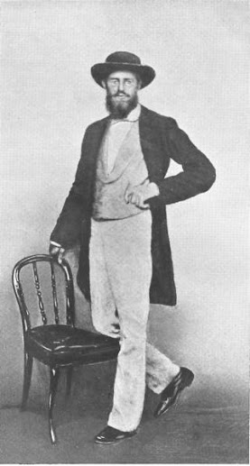Alfred Russel Wallace

- Born
- 8 January 1823
- Died
- 7 November 1913 (age 90)
Alfred Russel Wallace is known as an intrepid explorer, who spent time in Singapore, Malaysia, Borneo and the Amazon Basin, and who came up with a very similar theory of evolution to Charles Darwin, completely independently. It’s less well known that he was also part of an anti-vaccination movement, and he frequented séances.
Much has been made about Wallace being the ‘forgotten man’ of evolutionary biology. However, given his recent revival (and the sheer number of memorials he has accrued) that tag may not be appropriate any more.
Wallace grew up with his eight siblings in humble surroundings, and he did not have access to the top-notch education afforded to many aspiring scientists of his day. Instead, he attended school until he was 13 and later helped his brother as a land surveyor. This sparked a casual interest in biology, as the young Wallace was exposed to many plants in his daily work. He became more serious about the study of natural history in the 1840s, when he met beetle enthusiast Henry Bates. After a few years of collecting home-grown specimens, the pair decided to journey to the Amazon rainforest to expand their collections and further their studies.
However, it wasn’t all plain sailing. Wallace was struggling financially (he had had to sell specimens to fund his voyage) and at one point his ship was destroyed in a fire, along with all the specimens on board. He was also probably suffering from malaria when he formulated his evolutionary theory.
Wallace has been compared with Charles Darwin many times over the years. Darwin famously grew up as a Christian but lost his faith in the wake of his discoveries and the eventual publication of On the Origin of Species. Wallace had a religious epiphany after his return to England, in the form of spiritualism. One of the core beliefs of this faith is that spirits of the dead can communicate with the living. Followers do believe in a god so, unlike Darwin, Wallace seemed able to reconcile the coexistence of evolution and religion.
Wallace had an interest in several aspects of biology; one area of evolutionary biology that bears his name is the Wallace Effect. Wallace suggested that when two types of the same species have adapted via natural selection, to different conditions, they reach a point where hybrid offspring of the two types wouldn’t be as adapted as their parents. This would make them less likely to survive. Natural selection would then prevent future generations from successfully inter-mating. This is known as reproductive isolation. Research continues in this area, particularly in the investigation of sympatric speciation (the development of new species in the absence of a geographical barrier).
So while Wallace may not have been the most conventional scientist, there’s no doubting that he made significant contributions to biology, anthropology and biogeography.
This page was written by a Biology: Changing the World volunteer.



